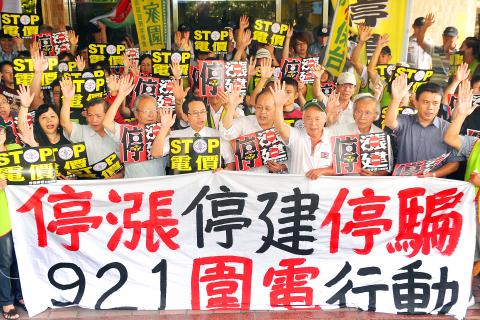Households and businesses with low electricity consumption rates will be given special consideration when the second phase of the electricity price hike takes effect in October, according to the Executive Yuan.
The government is considering excluding low-consumption households and small businesses from the rate hike, or allowing only a slight increase for them, Executive Yuan Secretary-General Chen Wei-zen (陳威仁) said on Wednesday.
Chen made the remarks after Premier Jiang Yi-huah (江宜樺) said in an interview on UDN TV on Tuesday that a reasonable rate increase should be implemented, since state-run Taiwan Power Co (Taipower) has kept its rates at a relatively low level that does not reflect its costs.

Photo: Liao Chen-huei, Taipei Times
The government is likely to decide on a slight increase in average power rates, after reviewing the power consumption patterns of residential units, small businesses and industries, the Ministry of Economic Affairs (MOEA) said.
The economy, people’s livelihoods and Taipower’s finances will also be taken into account, the ministry said.
Taipower spokesman Roger Lee (李鴻洲) said the company has not finalized a rate hike plan because it has not been given a clear directive to do so. However, such a plan is expected to be finalized by the end of the month.
Lee said all nine independent producers of electricity — Formosa Plastics Group’s Mailiao Power Corp, Taiwan Cement’s Hoping Power Co and seven private power firms — have agreed to revise their contracts with Taipower to reduce their prices. The move will save Taipower NT$1.54 billion (US$51.4 million) a year, he said.
Taipower has lost NT$35.2 billion in the first seven months of this year, which brought its cumulative losses to NT$228.8 billion.
However, with the higher summer electricity prices, which help limit consumption, Taipower earned NT$600 million in July.
The ministry began a three-phase rate hike plan in June last year. The first phase, which accounted for 40 percent of the total planned increase, took effect that month.
The second phase, which is set for October, will involve raising average electricity prices by 9.64 percent: industry rates will go up by 11.49 percent, commercial rates by 10.04 percent and household rates by 4.57 percent, the ministry said.
According to the ministry’s plan, about two-thirds of households and one-third of small businesses that use less than 330kWh of electricity per month would not be affected by the next price hike.

Several Chinese Nationalist Party (KMT) officials including Chairman Eric Chu (朱立倫) are to be summoned for questioning and then transferred to prosecutors for holding an illegal assembly in Taipei last night, the Taipei Police said today. Chu and two others hosted an illegal assembly and are to be requested to explain their actions, the Taipei City Police Department's Zhongzheng (中正) First Precinct said, referring to a protest held after Huang Lu Chin-ju (黃呂錦茹), KMT Taipei's chapter director, and several other KMT staffers were questioned for alleged signature forgery in recall petitions against Democratic Progressive Party (DPP) legislators. Taipei prosecutors had filed

Taiwan would welcome the return of Honduras as a diplomatic ally if its next president decides to make such a move, Minister of Foreign Affairs Lin Chia-lung (林佳龍) said yesterday. “Of course, we would welcome Honduras if they want to restore diplomatic ties with Taiwan after their elections,” Lin said at a meeting of the legislature’s Foreign Affairs and National Defense Committee, when asked to comment on statements made by two of the three Honduran presidential candidates during the presidential campaign in the Central American country. Taiwan is paying close attention to the region as a whole in the wake of a

NEW WORLD: Taiwan is pursuing innovative approaches to international relations through economics, trade and values-based diplomacy, the foreign minister said Taiwan would implement a “three-chain strategy” that promotes democratic values in response to US tariffs, Minister of Foreign Affairs Lin Chia-lung (林佳龍) said. Taiwan would aim to create a “global democratic value chain,” seek to capitalize on its position within the first island chain and promote a “non-red supply chain,” Lin was quoted as saying in the ministry’s written report to the Legislative Yuan submitted ahead of the legislature’s Foreign Affairs and National Defense Committee meeting slated for today. The Ministry would also uphold a spirit of mutual beneficial collaboration, maintaining close communication and consultations with Washington to show that Taiwan-US cooperation

Taiwan and the US have begun trade negotiations over tariffs imposed by US President Donald Trump earlier this month, Minister of Foreign Affairs Lin Chia-lung (林佳龍) said in an interview this morning before reporting to the Legislative Yuan’s Foreign Affairs and National Defense Committee. The Taipei Economic and Cultural Representative Office (TECRO), Taiwan’s de facto embassy in the US, has already established communication channels with the US Department of State and the US Trade Representative (USTR), and is engaging in intensive consultations, he said. Points of negotiation include tariffs, non-tariff trade barriers and issues related to investment, procurement and export controls, he